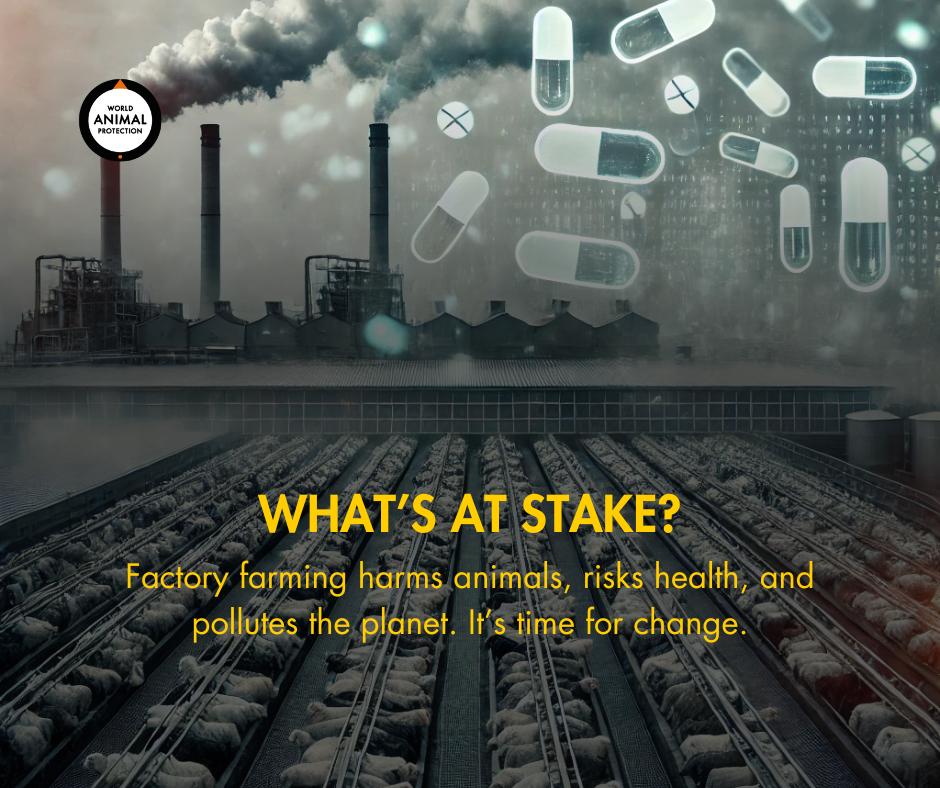
JBS in Nigeria: Why Industrial Farming Threatens Africa’s Future
Africa is at a crossroads. In late 2024, JBS, the world’s largest meat company, signed a USD 2.5 billion deal with the Nigerian government to establish six large-scale industrial facilities: three poultry plants, two beef processing plants, and a pork facility. Within months, it is said that feasibility studies and designs were already complete, and state governments began pledging land. Niger State offered 1.2 million hectares, while Cross River State pledged another 72,000 hectares.
Supporters of the deal describe it as a major opportunity for economic growth. But behind the promises lies a harsh reality. Factory farming is not development. It is destruction. The entry of JBS into Africa threatens communities, animals, ecosystems, and public health.
This article explores why JBS’s expansion is dangerous, the broader ills of industrial farming, and why Africans must resist this model in favor of humane, sustainable, and sovereign food systems.
Background: JBS and its Expansion in Nigeria
Who is JBS?
JBS is the largest multinational meat company in the world. Its operations span beef, poultry, and pork processing across continents. The company is notorious for:
- Animal cruelty in intensive farming systems.
- Deforestation and land destruction, particularly in the Amazon.
- Corruption scandals and labor rights violations.
- Greenwashing, presenting itself as sustainable while driving climate breakdown.
What is happening in Nigeria?
In November 2024, JBS struck a five-year agreement with Nigeria worth USD 2.5 billion. The deal grants JBS favorable economic, sanitary, and regulatory conditions to establish operations. By moving quickly and working directly with state governments, the company is bypassing much of the bureaucracy that normally slows large projects.
States like Ogun, Niger and Cross River see JBS as a potential revenue generator, offering vast tracts of land. But these pledges carry devastating consequences: displacement of indigenous communities, loss of ancestral lands, and destruction of local food systems.

The Harms of JBS’s Industrial Model
1. Displacement and Land Grabs
The JBS project risks uprooting thousands of indigenous communities from their ancestral homes. For generations, these lands have sustained families, cultures, and traditions. Displacing communities for factory farms is more than an economic issue, it is a violation of rights and sovereignty.
2. Animal Suffering at Scale
Factory farming subjects animals to unimaginable cruelty. Chickens and cattle are crammed into cages or feedlots, denied natural behaviors, and slaughtered in conditions that maximize profit while ignoring welfare. JBS is a global symbol of this system, treating animals as mere commodities.
3. Environmental Destruction
Industrial livestock farming is a leading driver of:
- Deforestation and habitat loss.
- Water depletion and pollution.
- Soil degradation.
- Greenhouse gas emissions, especially methane from cattle.
Expanding this destructive model in Africa would accelerate climate breakdown, threatening biodiversity and undermining efforts to adapt to climate change.
4. Public Health Risks
JBS’s model endangers human health. Overuse of antibiotics in factory farms fuels antimicrobial resistance (AMR), a silent pandemic already costing the world billions. Factory farms also create conditions ripe for zoonotic diseases that can jump from animals to people. Far from bringing security, JBS brings new risks to public health.
5. False Promises of Development
The rhetoric of jobs and revenue hides an uncomfortable truth. Profits will flow abroad, while local communities bear the costs, polluted air and water, unsafe labor conditions, and dependence on unstable global supply chains. Real development does not dispossess people or compromise their health.
What We Stand Against
The expansion of JBS in Africa symbolizes everything that is wrong with industrial farming. We oppose:
- The industrialisation of animal agriculture that sacrifices people, animals, and the environment for profit.
- The commodification of animals, stripping them of dignity and welfare.
- The displacement of indigenous communities from their land and traditions.
- The greenwashing narrative that equates factory farms with progress.
What Africa Needs Instead
Agroecology
Africa’s strength lies in farming systems rooted in local knowledge, nutrient circularity, and biodiversity. Agroecology respects both people and animals while ensuring food security without environmental collapse.
Humane Food Systems
Food systems should prioritize animal welfare, nutrition, and resilience. Humane farming treats animals with dignity and creates sustainable livelihoods for communities.
Food Sovereignty
Communities should decide what to grow, how to grow it, and what to eat. Food sovereignty is power, ensuring decisions are made for the people, not foreign corporations.
One Health Approach
Protecting humans, animals, and the environment together is the only way forward. Factory farming undermines this balance, while agroecology strengthens it.
Our Call to Action
The arrival of JBS in Africa is a wake-up call. If this model is allowed to spread, the consequences will be profound: mass displacement, entrenched cruelty, ecological collapse, and heightened health crises.
We cannot let factory farming define Africa’s food future. We must act now to:
- Reject JBS’s expansion and the industrial farming model it represents.
- Defend indigenous communities from displacement and exploitation.
- Protect animals from suffering in cruel industrial systems.
- Champion agroecology and humane farming as Africa’s true path to resilience.
Conclusion
JBS expansion in Nigeria is not progress. In truth, it represents the worst of industrial farming: displacement, cruelty, environmental destruction, and public health risks. Africa deserves better. By resisting JBS and rejecting factory farming, the continent can chart a path built on justice, sustainability, and compassion.
The choice is clear. Protect communities. Protect animals. Protect our future. Say no to JBS.